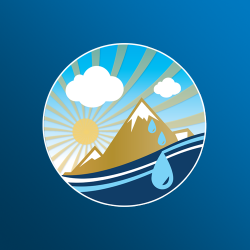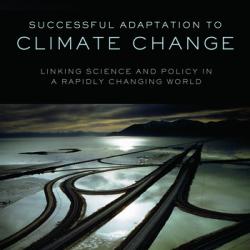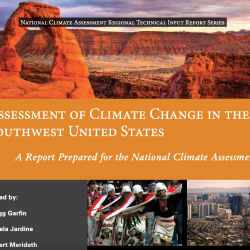2013
-
WWA contributes to paper on how climate change will affect the Colorado River’s flow
SpotlightRecent studies of the impact that climate warming will have on flow in the Colorado River have produced an unsettling range of estimates, from a modest decrease of 6 percent by 2050 to a steep drop of 45 percent by then. A new paper by researchers at CIRES Western Water Assessment, University of Washington, and NOAA investigates and explains why those estimates differ and summarizes what is known about the future of this iconic Western river—key information for decision makers.
-
WWA welcomes Elizabeth McNie
SpotlightWestern Water Assessment is proud to welcome the newest member of our research team, Elizabeth "Bets" McNie. Formerly an Assistant Professor of Political Science and Earth, Atmospheric & Planetary Sciences at Purdue University, Bets will serve as the evaluation coordinator for Western Water Assessment and conduct research on the effectiveness of regional climate services. Her primary area of expertise is improving the utility of climate-science information for decision makers, and the design and function of climate-service organizations. She is also interested more broadly in linking knowledge with action, climate-science policy, and how to shape research agendas to improve the relevance of scientific information for policy. In her spare time Bets likes playing guitar around a campfire, cooking gourmet meals, and living in a 'tiny home'.
-
WWA team members present to Navajo Nation on climate adaptation
SpotlightLast month, WWA team members Karen Cozzetto and Julie Nania presented on climate change adaptation planning at the 4th Annual Navajo Nation Agricultural Conference. Their presentation, which was also translated into Navajo, provided background information and examples from the in-progress Navajo Nation Climate Adaptation Report, and noted other adaptation efforts by the Navajo Nation.
-
WWA study assesses joint impact of dust-on-snow and climate change on Colorado River streamflow
SpotlightA study led by WWA's Jeff Deems, along with co-authors including WWA team members Joe Barsugli and Brad Udall, used hydrologic modeling to assess the impact of dust-on-snow—including the extreme dust loadings experienced in 2009 and 2010—on the volume and timing of runoff in the Upper Colorado River Basin under multiple climate scenarios. The study, "Combined impacts of current and future dust deposition and regional warming on Colorado River Basin snow dynamics and hydrology," has been published as a "discussion paper" in the journal Hydrology and Earth System Sciences, and anyone who is interested is invited to submit review comments on the paper.
-
WWA's Lisa Dilling publishes chapter on climate adaptation success
SpotlightBuilding on work from multiple WWA research projects, WWA's Lisa Dilling, along with Rebecca Romsdahl of the University of North Dakota, recently published a chapter entitled "Promoting Adaptation Success in Natural Resource Management Through Decision Support: Lessons from the Great Plains and Rocky Mountain Regions." Dilling and Romsdahl's chapter is in Successful Adaptation to Climate Change: Linking Science and Policy in a Rapidly Changing World, edited by Susanne Moser and Maxwell Boykoff.
-
WWA contributes to analysis of Southwest’s climate future
SpotlightIn an era of increasing climate instability, the southwestern United States faces strained water resources, greater prevalence of tree-killing pests, and potentially significant alterations of agricultural infrastructure. These threats and challenges as well as others are detailed in the new book, “Assessment of Climate Change in the Southwest United States.”
A hotter future is projected for the Southwestern United States—a region stretching from the California coast to the plains of eastern Colorado and New Mexico—and future heat and changes in precipitation will present challenges for managing natural resources, water, infrastructure and threats to human health.
The new book, “Assessment of Climate Change in the Southwest United States,” published by Island Press, is a landmark study that addresses these issues. It focuses on current climate conditions in the region, the environment of the past, what is projected to change over the 21st century and how this will impact ecosystems, water resources, agricultural production, energy supply and delivery, transportation and human health. The work includes major contributions from fourteen University of Colorado scientists, ten of whom are on the WWA research team.
A consortium of researchers from the Southwest Climate Alliance coordinated the assessment and the scientists are affiliated with the National Oceanic and Atmospheric Administration’s Regional Integrated Sciences and Assessment Program and the U.S. Department of the Interior Southwest Climate Science Center. The book blends the contributions of 120 experts in climate science, economics, ecology, engineering, geography, hydrology, planning, resource management and other disciplines. The book is one of ten regional technical inputs to the 2013 National Climate Assessment released in draft form earlier this year.
"It's exciting to be part of an effort that really brought together the best possible science on climate change in the Southwest," said CIRES Associate Director for Science, and WWA Director, Kristen Averyt, who is a lead author of a chapter of the book. "We now have a clearer, fuller picture of how warmer temperatures are leading to earlier snowmelt, greater evaporation, more wildfires, and other very serious impacts affecting pretty much every square inch of our region."
Besides Averyt, Brad Udall, who is now director of the Getches-Wilkinson Center for Natural Resources, Energy and Environment, is also a lead author of a book chapter. Other WWA team members who contributed to chapters are Joe Barsugli, Lisa Dilling, Eric Gordon, Jeff Lukas, Balaji Rajagopalan, Imtiaz Rangwala, William Travis, and Klaus Wolter. CIRES researchers Jon Eischeid, Maxwell Boykoff, and Brant Liebmann also contributed. The work of Ami Nacu-Schmidt (WWA and CSTPR) is also integral to the book, as she created or adapted the majority of the graphics illustrating the authors' findings.
The new book stresses the choices and opportunities available to society, in order to reduce the causes and effects of climate change in the region. It notes the steps governments, businesses, organizations and individuals are taking to improve energy efficiency, improve water supply reliability, decrease wildfire risk, and reduce greenhouse gas emissions.
“Assessment of Climate Change in the Southwest United States”is available from www.islandpress.org and at major retailers. The Assessment website http://www.swcarr.arizona.edu provides access to download full book chapters, short summaries of each chapter, and all graphics developed for the book.
-
Layers of dust on Colorado mountains to impact snowmelt and runoff
SpotlightWWA's Jeffrey Deems was quoted in a Denver Post article on southwestern dust found in snow across Colorado mountains. Excerpt from the article:
Dust blown in from the Southwest settled on snow over many of Colorado's mountains during this week's storm and will eventually affect how fast the snowpack melts and possibly how much water the state can hold onto. Researchers say the dust kicked up from Arizona, New Mexico and Utah by southwesterly winds fell in Steamboat Springs, Summit County, Vail, Aspen and the San Juan mountains. Dust was also scattered in the snow that fell along the Front Range, but it's likely that dust could have been carried by southeasterly winds from other areas too, including parched southeastern Colorado, the San Luis Valley and the Arkansas River Basin. Read more.
-
How much water will our future electricity generation portfolio require?
SpotlightA new paper by WWA's Kristen Averyt, along with collaborators at the National Renewable Energy Laboratory and the Union of Concerned Scientists, explores how freshwater withdrawals by electric power plants could change under a number of future electricity generation scenarios. Their analysis includes aggregation of results by second-order hydrologic units in order to accommodate how basin-level differences in water availability affect generation. Their paper is available freely here and is part of a broader "Focus on Electricity, Water, and Climate Connections" published in the journal Environmental Research Letters.


